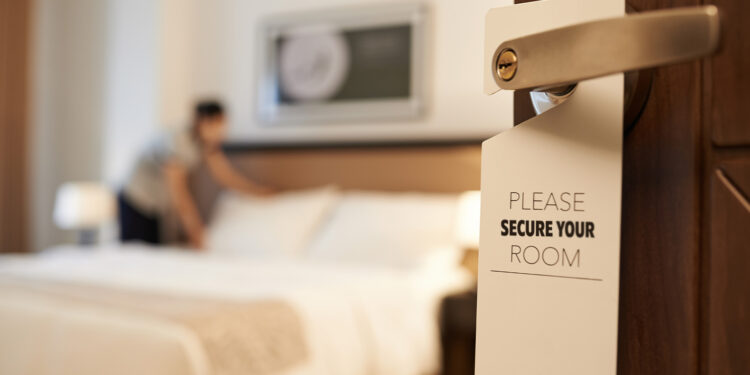Hotel Security for Business Aviation Travel – Part 1: General Considerations

This business aviation blog post is part of a series on hotel security briefs and tips for your business aviation travel.
Your greatest security risks on international travel, and even on domestic operations, are generally off-airport. Corporate crews routinely stay in hotels at assorted worldwide locations, and there are important considerations to be mindful of from both safety and security perspectives.
The following is an overview of what you need to know:
1. Minimum star levels
For Western European and U.S. travel, 4-star hotels are the suggested minimum standard for crew accommodation. Usually, these hotels have adequate security, surveillance and entrance controls as well as reliable standards in terms of fire codes and fire safety. When traveling to other parts of the world 4-star or above properties are also recommended. Be aware, however, that some amenities found in Western European and U.S. hotels may be lacking at some other international locations. Many general aviation (GA) operators prefer to use large European or U.S. chain hotels, in part because they maintain certain known safety and security standards. There are cases, however, where large chain hotels, particularly in more remote areas, may be lacking in terms of safety/security standards.
2. General hotel considerations
Especially when staying at a particular hotel for more than just one night, it’s important to be mindful of assorted security/safety risks and to avoid predicable routines. For example, don’t always go to breakfast, or meet in the hotel’s public lounge, at exactly the same time each day. Location of the room is another consideration. Ideally, it’s best not to be too close to the elevators but, rather, near the end of a hallway near an exit stairwell. Stairwells are often the most secure/safe point to be in during emergencies such as a fire, earthquake, or attack on the hotel. Be aware of access controls between public and guest room areas of the hotel. It’s best if the elevators require a room key to access your floor and to have a programmable room card, rather than an old style traditional metal key (still common at many international locations). Be aware if the hotel has a public restaurant or bar onsite that’s popular with more risky elements of the local populace or attracts very late night crowds.
3. Travel to/from hotels
In higher risk areas, particularly hotels far from the airport, it’s best to use pre-paid transport rather than public taxis. Even when staying in familiar locations it’s recommended to set up pre-paid transport, or to have the hotel book taxis for you. This is because if you’re familiar with a particular area you may not have a heightened sense of local security and/or may overlook potential risks in a familiar area. Always use common sense when traveling locally. If, for example, you take a public taxi to your hotel, and pay with a credit card, the driver will know both your name and your hotel. In such cases, it’s best to pay taxi fares with cash rather than credit cards. Also, avoid small talk and saying too much about yourself to drivers during the ride to your hotel. Always have back up local transport plans, as well as exit route strategies, in case road closures, strikes, local protests, earthquakes or bombings should occur.
4. Staying within the hotel
If you’re staying at a higher risk location for a few days – for example Mexico City, Juarez or Monterrey – choose a hotel with sufficient amenities so that you won’t have to leave the hotel. This may mean a more expensive property, and going over your rate cap, but you’ll have everything you need and will not have to venture out into potentially risky areas. Local area security briefs will indicate when a stay-within-the-hotel policy makes sense.
5. Additional Reading: Hotel Security Tips – Series Index
Note: Links will be updated as articles are published.
- Part 1 – general considerations
- Part 2 – hotel room considerations
- Part 3 – security briefs
Conclusion
Always be alert to your surrounding when staying in hotels and moving around the local area. Taking the effort to research safest and more secure hotel options is always a worthwhile use of time in the trip planning process.
Questions?
If you have any questions about this article or would like assistance obtaining a hotel security brief, contact me at traciecarwile@univ-wea.com.
Stay tuned for Part 2, which covers more hotel security considerations.




